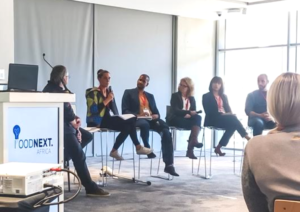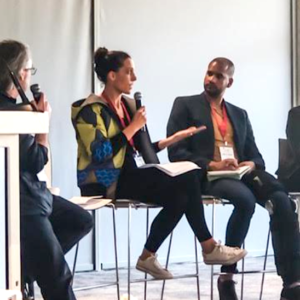The Future of Packaging
What is the future of packaging in a sustainable green economy?
This was the topic GREEN HOME’s founder and managing director, Catherine Morris, discussed on a panel at the Food Next Africa conference on Friday 28 September 2018 at the Cape Town International Convention Center.
It’s a question very close to her heart.
She loved sharing how plant-based biodegradable materials can contribute to a regenerative, waste-free and circular economy.
The Plastic Crisis
Catherine highlighted some key issues, for example:
Did you know over 300 million tons of plastic are produced every year? Almost half of that is used just once and then thrown away. Plastic lasts for between 450 years to forever.
Plastic food packaging is not designed to re-enter the system as a recyclable product as it’s contaminated with food. 91% of all plastic ever produced has never been recycled anyway. With these figures it seems clear that single use plastic is simply the wrong material to be using for take-away food packaging.
The good news, is that despite plastic food packaging being one of the worst offenders of plastic pollution – this is one of the easiest problems to fix.

Big Picture Thinking – Circular Systems
Catherine spoke about how product materials must be able to re-enter the system after use to be part of a truly circular economy. This is what nature does – through the mechanism of biodegradability.
Plant-based materials are naturally biodegradable, and they can be broken down, via composting, into their constituent parts – carbon, water, nitrogen, oxygen etc. These basic building blocks can then be used to build new plants, and new life.
As food is considered to “contaminate” it’s packaging, then composting the packaging along with the food waste is the perfect solution to keep materials as resources, not waste.
Composting – A Truly Circular & Waste Free Solution
The panel included Eddie Hanekom from the Department of Environmental Affairs, and composter Emile Fourie from Y-waste. They highlighted the need for increased composting to ease pressure on landfills and process organic waste in the most sustainable way.
Almost half (40%) of all general waste in South Africa is compostable. More good news is that there are plans to divert this resource from municipal landfills to composting sites where this resource can become something of value.
By using compostable products for take away food packaging and building city wide large-scale composting, we can reduce huge quantities of waste – and produce compost instead, which can feed back into the system.


